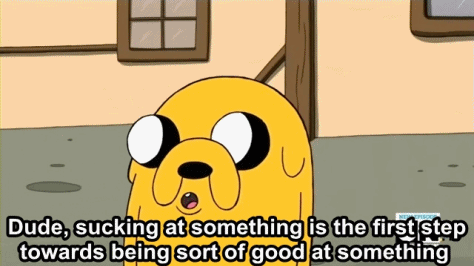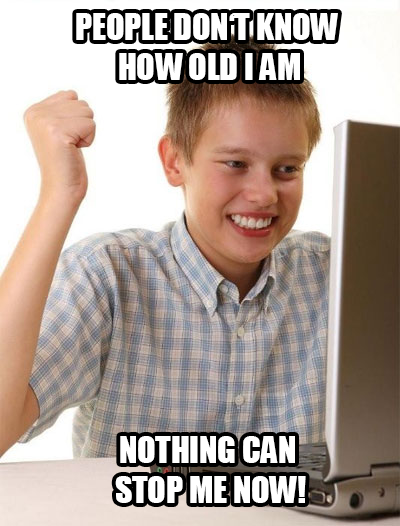For some time now, a lot of people suggested I should read Ender’s Game. The book was a sort of a puzzle to me. It seems to have influenced a lot of people I know from the Anglo-American culture. Most of them seem to have read it in their youth. Yet I never had contact with the book myself. I was somewhat put off by the author’s recent attitudes but I have quite some appetite for Sci-Fi and with the upcoming movie I decided to give it a go. I did not like it, to say the least.
Hitler’s Game
It seems I’m not the only one either. Doing some research I found a few interesting articles. John Kessel did a pretty good job at highlighting the underlying morality of the book. The book conveys and holds on to the idea that we should judge the morality of an action by it’s intention. According to this, killing somebody is ok if you sincerely didn’t like or mean it. The book ultimately goes as far as absolving genocide. Using this logic, the main character gets to be a murderer, later even a mass-murderer and yet he remains a saint and to some extent even the victim himself. It is the logic of child abuse: “It hurts me more than it hurts you. You will thank me for this some day.”
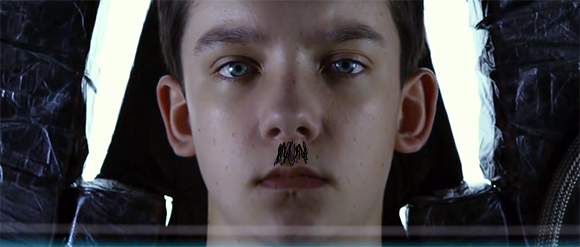
“Mein Führer, the gate is down”
Another article by Elaine Radford is more direct. Pointing out similar notions, she goes one step further and suggests the book is supposed to evoke sympathy for Adolf Hitler. She finds some uncanny similarities between Hitler’s and Ender’s Biography. Together with the idea Intiention-based Morality and the fact that the books ends with Ender pretty much wiping out an entire Species, they create a pretty convincing interpretation of the text. Indeed, quotes like these, used in context of the justification of murder, could have easily come from the Führer himself:
Our genes won’t let us decide any other way. Nature can’t evolve a species that hasn’t a will to survive.
Dr. Atom Bomb
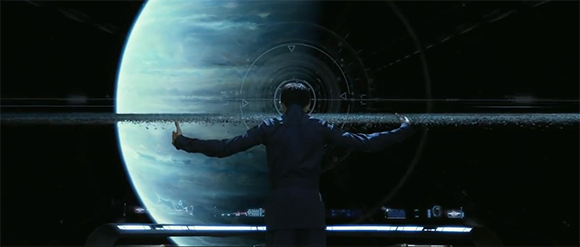
“Now I am become Death, the destroyer of worlds.”
While the outrageous Hitler-Theory has surprisingly a lot going for it, I personally don’t subscribe to it, if only for Godwinian reasons. Instead, I picked up another parallel to WW2. To some extent, the events depicted in the book mirror closely and justify the role of the United States in the Pacific War. A theme repeated over and over again is that of a justified, aggressive retaliation against an aggressor. Ender personally encounters two bullies in the story. In both cases he decides his only reasonable reaction is to beat them up so badly that they will never dare to threaten him again. He ends up killing his oppressors in both cases. The book depicts him walking away in both cases with a clean conscience. These two events echo the large-scale confrontation in the book. Earth has been attacked by evil aliens in the past. So humans sent out a fleet to attack the aliens at their homeworld to prevent more attacks. Ender plays a decisive role in the struggle. His solution is to blow up the alien’s home planet, wiping out the entire species. Everybody approves. It is the only way.
The parallels to Pear Harbor and the subsequent war between the U.S. and Japan are uncanny, right down to the use of Atom Bombs. Ender has at his disposal a secret weapon called “Dr. Device” (short for Molecular Disruption Device) which has the ability to blow up things in chain reactions. He eventually uses this to destroy the home planet. Ender’s Game therefore makes the argument that the use of the Atom Bomb against civilians was justified. After all, they started it.
What struck me is how manipulative and constructed the book is at making that argument. Never mind that it’s the Humans, who are the aggressors in this war, somehow we are constantly led to believe that this is Humanity’s last chance at survival. A diplomatic solution is out of the question due to the convenient fact that the alien’s minds are too alien to recognize us as living beings. And even though this is an offensive war, in every single battle Ender is out-numbered. Who planned this war anyway? The killer is constantly depicted as the victim, even as he is committing genocide. The kicker is when the aliens actually THANK him afterwards for killing them all and make him their post-mortem ambassador. I’m not making this up.
Applied to the Pacific War, this sets up a rather disturbing view of that tragically ambivalent confrontation. Even more disturbingly, the more recent military involvement of the U.S. follows similar patterns. Ender’s Game today remains as topical as ever. It almost seems to have become a manual.
Highest Grade Cardboard
Ender himself is as artificial and constructed as the war he is fighting in. The story starts when he is six. That would put him into the 1st grade. Yet, due to the wonder of eugenics (the Master Race says hi), he is super-intelligent. He is so intelligent, in fact, he can think himself out of physical threats. Two times he confronts enemies stronger and more trained than him. In both cases his pure intellect overcomes his lack of physical strength or experience. Throughout the entire story, he NEVER falters. Ender never stumbles. Never makes a mistake. I assume as a baby, he never pooped his pants. He never crawled on fours, one day he just figured out how to walk upright without even trying. Ender never has to face limits to his abilities. The only issue he apparently faces is jealousy. As Elane Radford puts it, he’s made of highest grade cardboard.
Superficially, this makes him simply a shallow and artificial character. Looking more deeply, as a book for young people this is a really shitty role model. I mean, sure, Ender represents everything you WISHED you could be when you were still in school and being bullied yourself. In this regard, the allure of the book is unmistakable. In the long run, a human character who learns his limits, who learns to accept himself in spite of them and learns to ask others for help would be a more valuable role-model to deal with the realities of growing up without becoming an asshole or committing suicide. I’ve been thinking a lot about female and male representation in media. Female gender roles are a can of worms by themselves. I feel there is a growing need to start discussing male gender roles as well.
Suffering by Intelligent Design

“He’s just masturbating again. Do we really need to watch him ALL the time?”
Another detail that struck me is the odd relationship between Ender and his superiors. Every chapter of the book is introduced by a discussion of Ender’s superiors. Apparently they are observing him all the time and taking an insane amount of care about every detail of his waking life. We are led to believe that every moment of Ender’s life is carefully orchestrated by benevolent forces. Yet the results of all this is an awful lot of suffering for Ender. Even the bullies Ender has to kill have been deliberately given free reign. All of this is an elaborate set-up, a challenge. The idea is that Ender has to go through these complicated tests in order to become that special kind of person they need. Ender has to go through all this hardship not in spite of being so good but BECAUSE he is so good – because he can take it.
Some of the above authors mentioned how this is basically the depiction (and justification) of abusive parents. I agree this is one possible interpretation. I would also suggest another: it is the analogy and an answer to the theological Problem of Evil. One issue most religions have to deal with is why bad things happen to good people. Why would our omipresent and omniponent maker still allow his most devoted followers to be exposed to suffering and pain. Ender’s Game presents an answer: it is a test and part of a bigger plan. In effect, an iteration of Irenaean theodicy.
But then the book never seems to follow up on that notion because Ender never seems to actually change. He comes in as a superman and he leaves as a superman. All of his training doesn’t amount to much. He passes all the test with flying colors, suggesting he already knew what was necessary all along. The lack of payoff makes all of the challenges look weirdly sadistic. And there is always that fridge horror of the other students. What happened to all the other students that went to a similar ordeal as Ender but never became the war heroes they’ve been training for? Where is the divine justice in their suffering?
Worshiping Entitlement
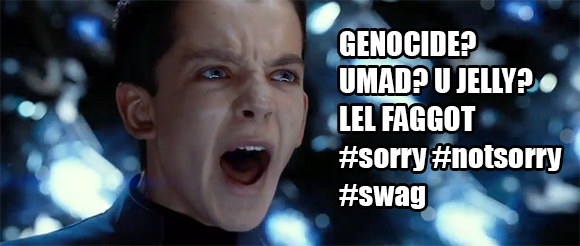
Ender’s Game is what Joffrey would have written if he actually wrote Game of Thrones.
At the core of why the book is so incredibly popular among young people lies what I think is probably the most repulsive aspect of the book. It is essentially the worship and glorification of entitlement. It is an artificial world in which the rampart ID of one arrogant teenage prick is sculpted outward and extended to shape the entire world around him. Ender doesn’t just think he is a teenage superhuman genius and the center of the universe, he actually IS all of this. He actually is able to see through everybody’s intention. The adults actually DO make the world intentionally unfair and biased against him. All his bullies and enemies ARE actually just jealous of him. And in the end, everybody actually ends up depending on him because he is the best.
Again, in times of aggressive internet trolling the novel comes out depressingly topical. In one part of the book, Ender’s equally brilliant siblings realize at age 11 or so that the world political climate is destabilizing. They decide to – I kid you not – become rulers of the world by posting on internet forums. The best thing is – they succeed.
Of course, the book was written in 1985, at least 10 years or so before the Internet evolved into the a form resembling what we know today. It is nonetheless striking how spot-on it is in catering to the contemporary forms of adolescent megalomania. It is also noteworthy how the Internet in the book deviates from how the Internet turned out. In the book, kids need to figure out a way to get adult credentials before posting online. Otherwise they wouldn’t be able to post in serious discussion forums. Today, most of us would be glad if a system was in place to filter out comments by underage posters. On the other hand the unrestricted mingling of anonymous posters led to a dramatic deflation of the importance of the internet as a platform for serious political discourse. It’s teh Internetz, LOL. But the idea that kids with so little experience in writing and politics could still, by their sheer wits, rise above all of the other, more experienced authors is not only ridiculous bit also perfectly reflects the motivation of an average entitled teenage internet dipshit. Again, Ender’s Game proves to have become a manual.
_________________________________________________________________________________________________
Ender’s Game is for kids. Kids seem to love Ender’s Game. But Ender’s Game is also full of seriously problematic content. From straight political propaganda to self-rigorous morale to self-destructive role-models and the cultivation of entitlement. It saddens me that this is one of the most popular Science Fiction novels of our time. It also saddens me how topical it is today.

